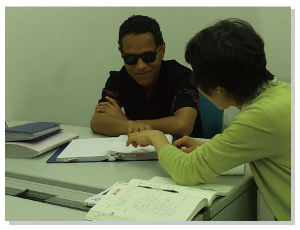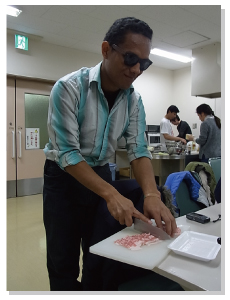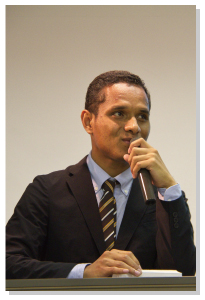- HOME
- Alumni News
- Jabis Ngibutai MANAIKA (17th trainee)
- Jabis's Final Report
Jabis's Final Report
Final Report
1. Introduction
I am the first ever trainee from the Solomon Islands to participate in the Duskin leadership training program. I am from a family of four. Before coming to Japan, I was working for a radio station
2. The reason I applied for this training program
First, I love learning new things. I wanted to study Japanese culture and the Japanese language in Japan that I had never studied before
Next, the government of Solomon Islands does not have any law for people with disabilities formulated on international standards. This means any disability movement can be very tough. I wanted to change this situation and wanted to take part in this training program no matter what, even if it meant leaving my job.
Third, Japanese culture is very well-known in my country so I personally wanted to know more about it. Comics and chopstick manners are very well-known in my homeland.
Last, I thought I would be able to learn without worries because it is a large company in Japan Duskin supporting this training program.
3. The things in Japan I experienced for the first time
(1) The Japanese language
Before coming to Japan, I did not know any Japanese at all. For about three months after arriving in Japan, I studied Japanese. It was so difficult. My teachers were worried I might not be able to learn to speak Japanese, but I wanted to tell many interesting or funny stories, so almost every day I created new sentences. Thanks to my teachers’ great instructions, I was eventually able to speak simple Japanese. I also studied Japanese Braille. Going forward, I would also like to learn kanji. I will work hard on it!

(2) Learning to swim
In my life I had never practiced swimming. In Japan I swallowed so much water in the swimming pool, but I practiced repeatedly and eventually, I was able to swim 25 meters.
(3) Home-stay
In the New Year I experienced home-stay in Nagasaki with my Matsumoto host family. I had such a wonderful experience in Nagasaki like tasting different, wonderful food every day, and visiting many famous places in family Matsumoto’s car. I felt as if it was the life of a king! The family also taught me about Japanese culture.
(4) Skiing
After coming back to Tokyo, we set out to Niigata for skiing. It was very cold in Niigata. It was especially hard for me to adjust to the cold climate as I am from a hot country, but I had a great time! After skiing I dipped in a large hot spring with many others. It was slightly embarrassing, but felt good.
(5) Running
Sometimes we went jogging with people from a club called Achilles International Japan in Yoyogi Park. It was a lot of fun every time and as I became friends with them, I fell in love with running. Studying is important of course, but I think physical exercise is also important. I also played table tennis in Osaka for the first time in my life. This was also a terribly fun experience.
4. Individual training
During my individual training, I learned two important things. First, I learned about electronic devices for people with visual impairment, and second, welfare for people with disabilities.
First of all, I learned there were many electronic devices to assist people with visual impairment. I went to “At Ease” to learn how to operate a personal computer. Thanks to Mr. Nishimura’s wonderful instructions, I now understand how to use a personal computer. I learned how to use Microsoft Word, PowerPoint and Excel, and I can use them almost as freely as I wish now.
At Assistive Technology Development Organization ATDO, I learned how to use DAISY. I learned that DAISY’s software to make books was free, which I found was an important mechanism for producing more DAISY books. A blind person can read books if they are available in DAISY because they can hear recorded voices. I wanted to create my own DAISY books. The members of staff at ATDO taught me a lot of knowledge and technologies, so eventually I was able to make my own book.
At Nippon Lighthouse Welfare Center for The Blind, I learned not just about electronic devices, but also about the Braille library system, so I now have a better understanding of Braille libraries. For example, books printed in ink can be translated into Braille and these Braille data can be uploaded to an online library. Then, anyone can download Braille books from the online Braille library.
The other important thing I learned was welfare for people with disabilities. I learned many things about the welfare at NPO. Co. Rokuseikai Hamamatsu Workshop with the Disabled-WITH, from Ms. Shiba. She said, people with and without visual impairment were to work together. What kind of tools would that require? There are two important tools that will assist people with visual impairment to work. One, the sound. Something you can hear. Two, an uneven surface, something you can touch to understand. There were many people with disabilities working at WITH, and a variety of things they could hear and touch, that helped them to work. At WITH, they never used “difficult” words. If they faced a problem, they put all their energy together to think about how to solve the problem.
The other important thing I learned at WITH is the concept of equal society. This is also so important. Japan is such a convenient country, but there are still many countries who do not have Braille blocks or elevators. Why? There are many people in Japan, with good thinking patterns you see in Japan. When a leader emerges from these people, they will support disability movement. This is the concept of equal society.

5. What I would like to do when I go home
(1) In the Solomon Islands, I will teach what I learned during the Duskin leadership program in Japan.
I would like to pass on my knowledge to people with disabilities, my colleagues with disabilities, and their supporters.
(2) I would like to produce a radio program about people with disabilities.
There are many radio listeners in the Solomon Islands. If I can produce a radio program about people with disabilities, it will give the listeners a chance to learn more about people with disabilities.
(3) I will talk to government authorities about people with disabilities.
I feel it will be possible for me to take part in large government conferences once I build on my activities. When time comes,I will attend these conferences and introduce what I have learned in Japan, and my experiences in the Solomon Islands.
(4) Studying Japanese
Even after I go back to my country, I would like to continue my Japanese language studies. I will also email my friends in Japan often. When Japanese people come to the Solomon Islands I would like to help them as an interpreter.
(5) I would like to build a school.
The big dream of mine is to build a school for people with visual impairment. I would like to be a teacher. Once I raise funds I definitely would like to establish a school. Right now the Solomon Islands does not have any school for people with visual impairment.
6. Summary
This training has given me such a wonderful experience. After studying many important things for about 10 months, my feelings and thinking have totally changed. Before coming to Japan, I was only thinking about myself. But now, I think about what to do for others.
From this training program, I learned not only about the Japanese culture, but also a little bit about the cultures of the countries the other trainees are from. It was also a wonderful opportunity.
There are so many things to be done, awaiting me in the Solomon Islands. Some may be hard, but I am going to be a leader for people with disabilities, after learning so many things in such great depth.
With these words I conclude my final report. I would like to express my heartfelt thanks to everyone at Duskin AINOWA Foundation, my training destinations, and Japanese Society for Rehabilitation of Persons with Disabilities, everyone who kindly supported me. Thank you so much!





